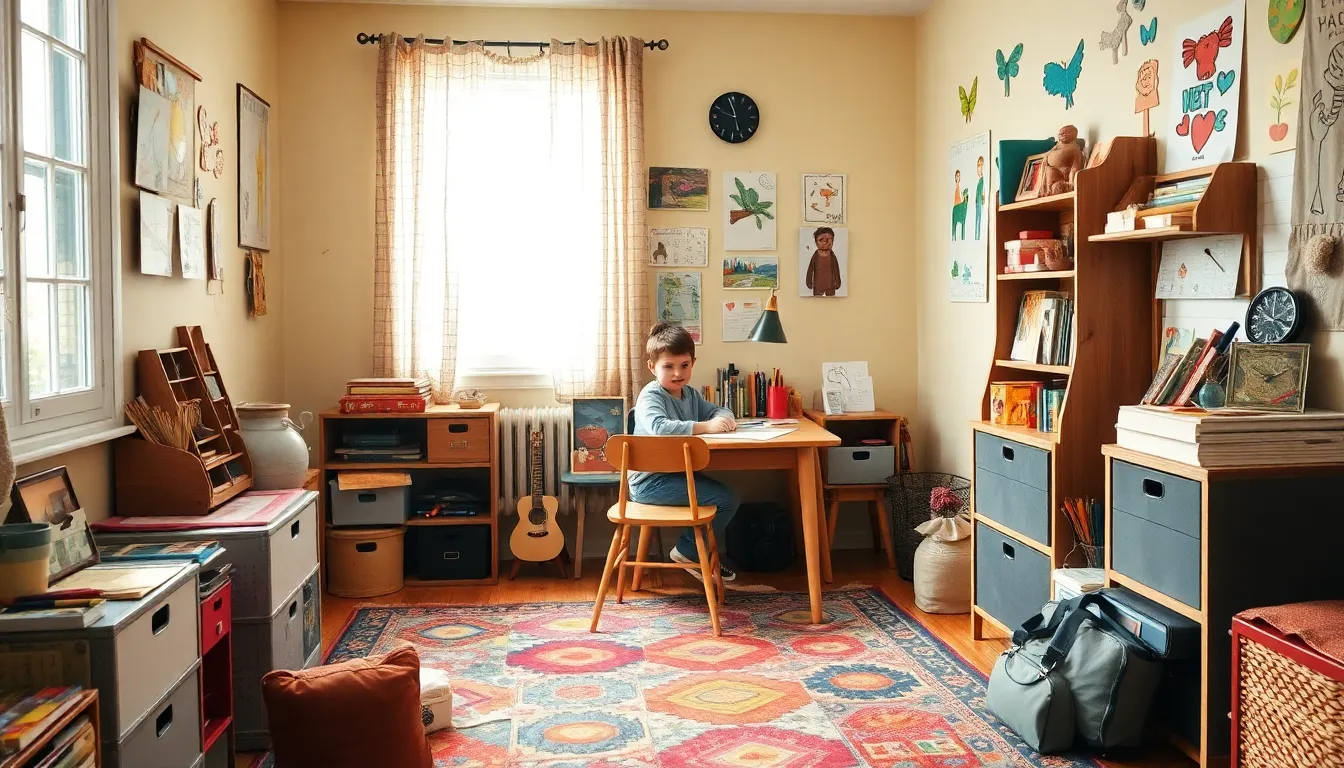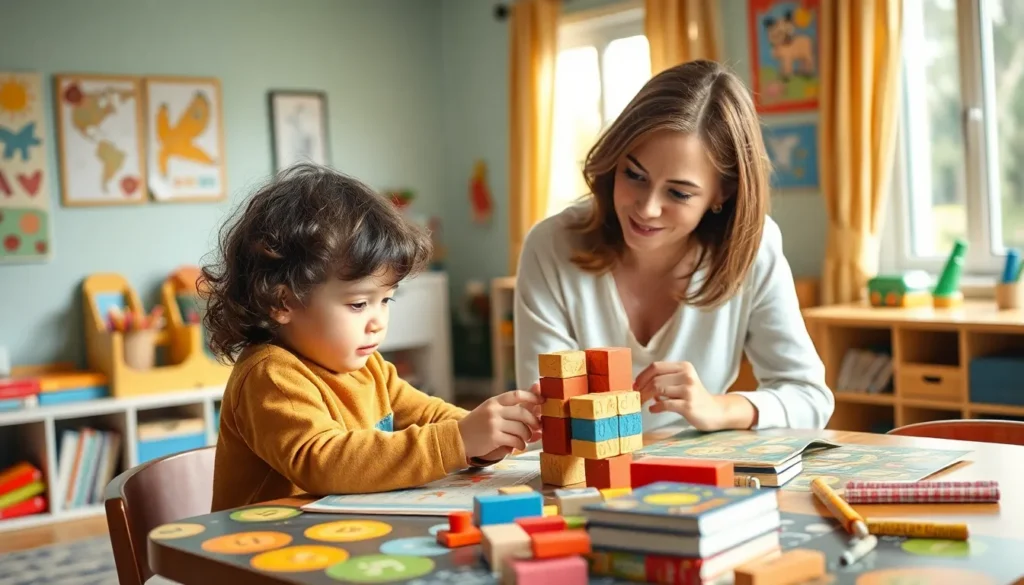Table of Contents
ToggleParenting can feel like a never-ending game of whack-a-mole, especially when it comes to education. Just when one challenge gets solved, another pops up, often with a side of homework and a sprinkle of tantrums. But fear not! Armed with the right educational parenting tips, anyone can turn chaos into a learning adventure.
Understanding Educational Parenting Tips
Educational parenting focuses on strategies that enhance a child’s learning experience. Using effective methods fosters a supportive environment where children can thrive academically and socially.
Importance of Early Education
Early education plays a critical role in a child’s development. Studies show that children who engage in structured learning before age five achieve higher academic success. Cognitive skills improve, and critical thinking emerges through early exposure to various subjects. Additionally, social skills develop as young learners interact with peers. Parents can support this growth by encouraging reading, exploration, and curiosity at home.
Balancing Academics and Play
Balancing academics and play contributes to a well-rounded education. Play enhances creativity, problem-solving, and social interactions in children. Moreover, integrating play with learning activities increases motivation, making education enjoyable. Assigning structured playtime also allows children to decompress and recharge, promoting mental well-being. Parents can incorporate educational games and outdoor activities that reinforce classroom concepts while fostering a love for learning.
Strategies for Effective Learning

Creating an effective learning strategy involves several key components and approaches that support children’s educational development. Environments and experiences designed for learning play crucial roles in fostering curiosity and motivation.
Setting Up a Positive Learning Environment
Establishing a positive learning environment is fundamental to a child’s education. This space should be organized, comfortable, and free from distractions. Use bright lighting and comfortable seating to enhance focus. Incorporate educational materials like books and art supplies within reach. Personalize the space with the child’s artwork to encourage ownership and pride. Regularly assess and adapt the environment as the child’s needs change. Keeping an open line of communication with the child fosters a sense of security and promotes active participation in learning.
Encouraging Curiosity and Exploration
Encouraging curiosity and exploration helps develop critical thinking skills. Provide diverse materials that spark interest, such as science kits or art supplies. Initiate discussions about various topics by asking open-ended questions. Encourage the child to ask questions and seek answers through exploration. Outdoor experiences enhance learning and allow for hands-on discovery. Activities like nature walks or museum visits cultivate a sense of wonder and curiosity. By regularly supporting exploration, parents nurture a lifelong love of learning in their children.
Communication Techniques
Effective communication techniques play a crucial role in fostering educational growth at home. These methods enhance understanding and strengthen the parent-child relationship.
Active Listening Skills
Active listening skills significantly impact a child’s ability to express themselves. Parents can focus entirely on their child’s words, avoiding distractions like phones or TV. By making eye contact and nodding, they signal engagement. Reflecting back what the child says ensures comprehension and shows that their feelings matter. Techniques such as summarizing statements or asking clarifying questions enable deeper dialogue. Practicing patience while allowing pauses encourages children to share their thoughts freely. Overall, these strategies cultivate a trusting environment where children feel heard and valued.
Encouraging Open Discussions
Encouraging open discussions fosters a safe space for children to share viewpoints. Parents can ask open-ended questions that stimulate conversation, such as “What was the best part of your day?” Responses to such questions promote sharing of experiences. Highlighting the importance of all opinions nurtures diverse thinking. Establishing regular family meetings creates a routine where every voice is welcome. Additionally, parents should offer feedback that balances affirmation with constructive criticism. This approach not only strengthens communication but also empowers children to think critically and express themselves confidently.
Fostering Independence
Fostering children’s independence enhances their self-esteem and confidence. Parents play a crucial role in guiding them through age-appropriate responsibilities.
Age-Appropriate Responsibilities
Assigning tasks based on developmental stages encourages children to manage expectations. Younger kids might handle simple chores like setting the table or organizing toys. As they grow, responsibilities can increase, including tasks like helping with laundry or preparing simple meals. Gradually, these duties teach essential life skills while promoting autonomy. Setting clear guidelines and offering praise reinforces their efforts, making them more likely to embrace challenges. Children learn accountability when parents provide opportunities to manage their tasks without micromanagement.
Allowing for Safe Failures
Encouraging safe failures allows children to learn from their mistakes. Situations like letting them tackle homework without intervention build resilience. Providing opportunities for controlled risks fosters problem-solving skills. When children face challenges, they develop the ability to adapt and find solutions. Resilience often stems from navigating failure in low-stakes environments, preparing them for future challenges. Support through these experiences helps them recognize growth opportunities in setbacks. Parents can reinforce this by discussing outcomes and encouraging reflection on what they learned.
Leveraging Technology in Education
Technology plays a vital role in enhancing educational experiences at home. Parents can utilize various tools to engage children in learning.
Recommended Educational Apps
Numerous educational apps promote interactive learning. Apps like Khan Academy Kids, ABCmouse, and Duolingo provide engaging content tailored to different age groups. Khan Academy Kids focuses on early literacy and math skills. ABCmouse covers a wide range of subjects for preschool to second-grade learners. Duolingo makes language learning fun through gamified lessons. Selecting age-appropriate apps encourages self-paced exploration, allowing children to learn at their own speed while enjoying the process.
Screen Time Guidelines
Establishing screen time guidelines promotes healthy tech usage. The American Academy of Pediatrics recommends up to one hour of high-quality programming daily for children aged two to five. Emphasizing quality over quantity ensures that educational content benefits young minds. Parents can monitor screen time by setting specific limits and designating tech-free periods. Maintaining open discussions about online safety fosters responsible habits. Integrating technology with physical activities, such as using educational apps during breaks, encourages a balanced approach to overall development.
Navigating the complexities of educational parenting can be daunting but rewarding. By embracing effective strategies and fostering a supportive environment, parents can significantly enhance their child’s learning journey. Encouraging curiosity and creativity while balancing academics and play lays the foundation for lifelong learning. Open communication and fostering independence empower children to express themselves and tackle challenges with confidence.
Incorporating technology wisely can further enrich educational experiences, ensuring children stay engaged and informed. With these tips in mind, parents can transform everyday challenges into meaningful opportunities for growth and development.




